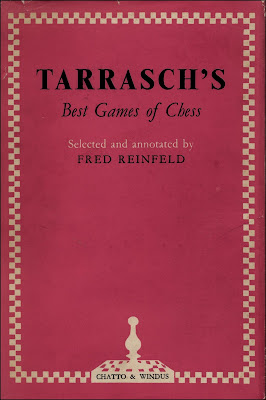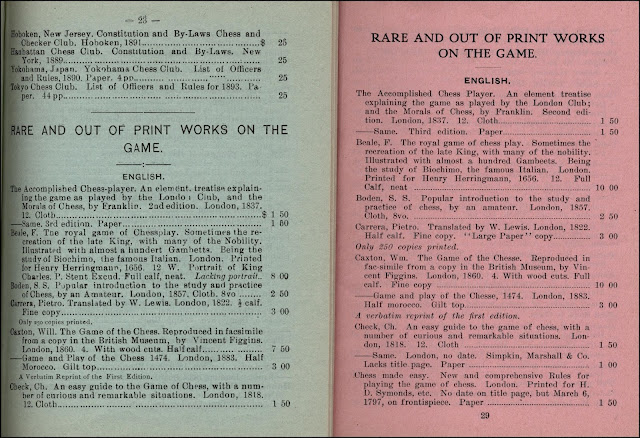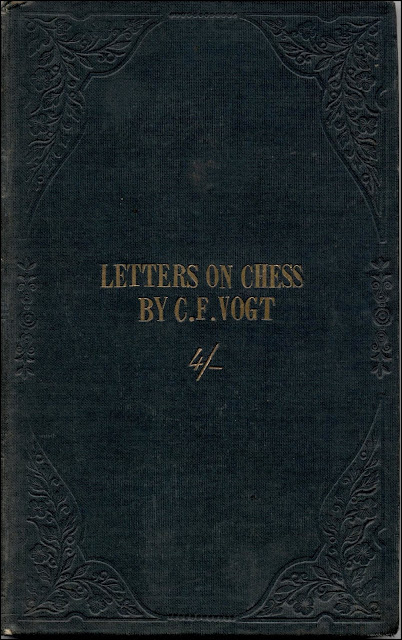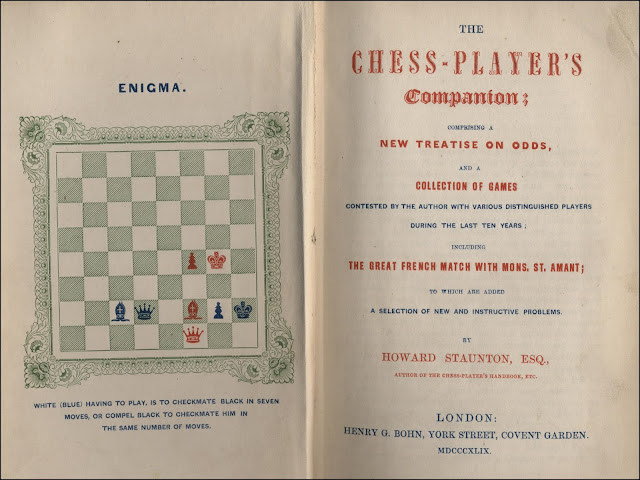I have been rereading Chess Reader recently, the periodical edited and published by Ken Whyld, which ran from Spring 1955 to October 1963. Two later issues were published by The Chess Player (Tony Gillam) of Nottingham in 1965 and 1966.
Described by Dr. Meindert Niemeijer in the Foreword as a magazine for chess bibliophiles, this periodical largely consisted of reviews of contemporary chess literature with a few related articles. Most of the reviews are by Ken Whyld although other reviewers included William Winter, James Gilchrist, Leonard Barden, David Hooper, Assiac (Heinrich Fraenkel), W. H. Cozens, and in the later issues Bernard Cafferty and Christopher Williams.
 |
| Ken Whyld |
The editor had a passion for chess history and literature, and, while the reviews were written primarily to discuss the merits or otherwise of the books for contemporary chess players, there was often an element of evaluating the importance and permanent value of the book in chess literature as a whole, and it is interesting to compare the reviews of 50 or 60 years ago to today's assessment of these works.
Original copies of Chess Reader are virtually impossible to find but a reprint by Publishing House Moravian Chess, Olomouc, is readily obtainable.
This periodical is packed with Ken Whyld's entertaining and forthright reviews and is a rich source of material for chess literature enthusiasts (and my blog). Some of the items that I particularly noted follow, and I will give the date and page numbers of the original magazines, which I do not have, as well as the page number in brackets from the reprint, which I have used.
The permanent value of chess books and publications by MacGibbon and Kee.
The Spring 1955 issue gets off to a lively start and includes a long and interesting review, on page 7 (page 7), of World Chess Championship 1954 by H. Golombek, published by MacGibbon and Kee, London 1954. In this review Whyld raises the matter of tournament and match books as having greater permanent value and being more highly prized by connoisseurs than by the average chess player, upon whom publishers mainly rely. Publishers had consequently generally avoided tournament and match books and had concentrated on games collections and general treatises "works in fact of less permanent value to chess, but easier to sell".
This was the third chess book published by MacGibbon and Kee, following:
Championship Chess, Match Tournament for the Absolute Chess Championship of the U.S.S.R., Leningrad-Moscow 1941, by M. M. Botvinnik, London 1950, and One Hundred Selected Games by M. M. Botvinnik, London 1951.


The only other chess books that I can find by the same publisher are:
World Chess Championship 1957 by H. Golombek, London 1957.
Modern Opening Chess Strategy by H. Golombek, London 1959.
The Delights of Chess by Assiac (Heinrich Fraenkel), London 1960.
English chess libraries?
Page 19 (page 19) of the Summer 1955 issue has a review of The 1000 Best Short Games of Chess by I. Chernev, New York 1955. Whyld calls Chernev the "believe-it-or-not" man of American chess, presumably implying that he is an unreliable author. He later refers to the dust-jacket of this book of brevities, which declares that if we owned one of the four or five great chess libraries in the world, "you could, by diligent research, find most or all of these delectable nuggets". Whyld goes on to say "there are, to my knowledge, four libraries in this country from which most or all could be found". I would hazard a guess at Whyld and Golombek, but who were the other two?
Britain's best living chess author?
On Page 23 (page 23) of the Summer 1955 issue, in a review of Kings of Chess by William Winter, London 1954, Whyld characterizes William Winter as "Britains best living chess author. No other writer captures Winter's cultured and literary style and is also able to annotate games in a manner so helpful to the average player". Winter died shortly after this was written but not before contributing a review of Emanuel Lasker, Chess Champion by J. Gilchrist, Nottingham 1955, for this magazine, Winter 1955-6, page 48 (page 48).
Page 32 (page 32) of the Summer 1955 issue has a review of Indian Chess Bulletin, Organ of the Correspondence Chess Association of India. In this, Whyld refers to four short lived pre-war Indian chess magazines, but it is not clear which periodicals he is referring to. The following are recorded in bibliographies but two are post-war:
Betts De Felice's
Chess Periodicals
The Indian Chess Magazine 1922 1 issue 7-66 1133
The Indian Chess Magazine 1931 1 issue 7-73 1135
Indian Chess 1947 1 issue 30-24 2994
Betts De Felice's
Chess Periodicals
The Indian Chess Magazine 1922 1 issue 7-66 1133
The Indian Chess Magazine 1931 1 issue 7-73 1135
Indian Chess 1947 1 issue 30-24 2994
(This is dated 1925 in Chess Periodicals)
Indian Chess Magazine 1949-50 12 issues 7-121 1132
Chess Periodicals also lists no. 1835, Picnic Magazine: A Journal of Literature, Science, Chess and the Drama, published in Calcutta in 1848.
Incidentally, Indian Chess Bulletin, the subject of this review, is not recorded in Betts , nor is Indian Chess Magazine, published in Bombay in 1964, according to Chess Periodicals No. 1136.
In the Autumn 1958 issue, page 8 (page 128), Whyld states "Larry Evans is undoubtedly the most important chess author in the USA today". This may raise a few eyebrows but Whyld quickly qualifies this by saying that "the competition is not fierce", and gives brief appraisals of a few American authors. "Chernev is always interesting and entertaining, Horowitz always professionally competent, Fine variable but with outstanding moment". There is no mention of Reinfeld.
So could it be Reuben Fine's Chess Marches On!, New York 1945, hailed as "the finest chess book that has come from U.S.A." by Whyld's friend and colleague E. G. R. Cordingley, albeit in an advert, on the back of his Chess Students Quarterly for November 1946; or perhaps Fine's The Middle Game in Chess, New York 1952, praised as "one of the most valuable contributions to chess theory in recent years", and "one of the best chess books on theory ever produced", in a review by D. A. Yanofsky in The British Chess Magazine for January 1954, page 15.
Maybe it was one of Reinfeld's from his pre-potboiler period, such as Tarrasch's Best Games of Chess, Philadelphia 1947, again described by Cordingley, in Chess Students Quarterly, December 1947, page 171, as "one of the best chess books of this century".
Long articles by guest contributors were a feature of the early issues and the Autumn 1955 issue has a three and a half page article by François le Lionnais, on pages 35 to 38, in which he discusses chess book collecting and some of the great chess libraries. This is followed by two articles from D. J. Morgan, in the Winter 1955-6 and Spring 1956 issues, detailing all of the books in the A. C. White Christmas Series, giving valuable information on these highly sought after chess books. A further article on the Overbrook Press series of chess books, under the nom de plume of Guynebans, was included on pages 13 to 15 (pages 73 to 75) of the Spring 1956 issue.
More from Chess Reader next time.
Indian Chess Magazine 1949-50 12 issues 7-121 1132
Chess Periodicals also lists no. 1835, Picnic Magazine: A Journal of Literature, Science, Chess and the Drama, published in Calcutta in 1848.
Incidentally, Indian Chess Bulletin, the subject of this review, is not recorded in Betts , nor is Indian Chess Magazine, published in Bombay in 1964, according to Chess Periodicals No. 1136.
The best American chess book since 1945?
Following a review of Trophy Chess by Larry Evans, on page 34 (page 94) of the Summer 1957 issue, Whyld implied that this was the second best chess book published in the USA since 1945 (see Spring 1958, page 60 (page 120)). So what did he consider the best? I have not found the definitive answer but there are clues.In the Autumn 1958 issue, page 8 (page 128), Whyld states "Larry Evans is undoubtedly the most important chess author in the USA today". This may raise a few eyebrows but Whyld quickly qualifies this by saying that "the competition is not fierce", and gives brief appraisals of a few American authors. "Chernev is always interesting and entertaining, Horowitz always professionally competent, Fine variable but with outstanding moment". There is no mention of Reinfeld.
So could it be Reuben Fine's Chess Marches On!, New York 1945, hailed as "the finest chess book that has come from U.S.A." by Whyld's friend and colleague E. G. R. Cordingley, albeit in an advert, on the back of his Chess Students Quarterly for November 1946; or perhaps Fine's The Middle Game in Chess, New York 1952, praised as "one of the most valuable contributions to chess theory in recent years", and "one of the best chess books on theory ever produced", in a review by D. A. Yanofsky in The British Chess Magazine for January 1954, page 15.
Maybe it was one of Reinfeld's from his pre-potboiler period, such as Tarrasch's Best Games of Chess, Philadelphia 1947, again described by Cordingley, in Chess Students Quarterly, December 1947, page 171, as "one of the best chess books of this century".
Long articles by guest contributors were a feature of the early issues and the Autumn 1955 issue has a three and a half page article by François le Lionnais, on pages 35 to 38, in which he discusses chess book collecting and some of the great chess libraries. This is followed by two articles from D. J. Morgan, in the Winter 1955-6 and Spring 1956 issues, detailing all of the books in the A. C. White Christmas Series, giving valuable information on these highly sought after chess books. A further article on the Overbrook Press series of chess books, under the nom de plume of Guynebans, was included on pages 13 to 15 (pages 73 to 75) of the Spring 1956 issue.
More from Chess Reader next time.
© Michael Clapham 2016















































